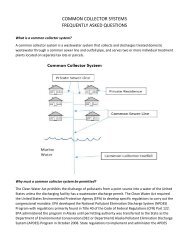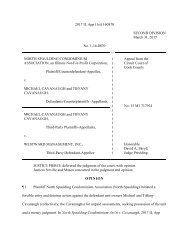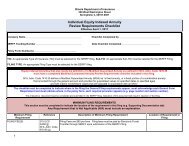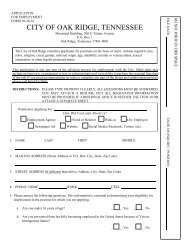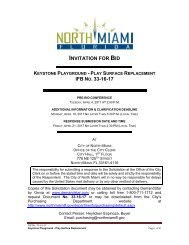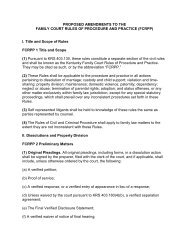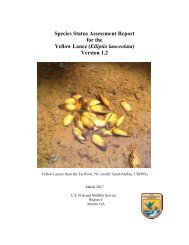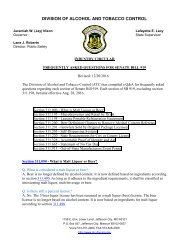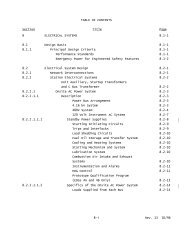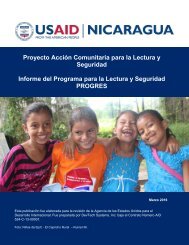Gender Integration
pbaae696
pbaae696
Create successful ePaper yourself
Turn your PDF publications into a flip-book with our unique Google optimized e-Paper software.
• Is the use of sexual- and gender-based violence as a weapon<br />
of war criminalized?<br />
• How are males and females affected differently as victims<br />
of violence? What are the differences between males and<br />
females as perpetrators of violence?<br />
(See Module 9 on Integrating <strong>Gender</strong> into Reconciliation,<br />
Peacebuilding, and Transitional Justice for more information.)<br />
SECTION II. Integrating <strong>Gender</strong> into Rule<br />
of Law and Justice Sector Programming:<br />
Challenges and Opportunities<br />
1. Within the Formal Legal Framework<br />
Challenge: Create and implement gender-sensitive laws and<br />
legal mechanisms.<br />
Opportunities:<br />
• International treaties. Support civil society efforts to<br />
encourage governments to ratify international and regional<br />
human rights treaties, such as the Convention to Eliminate<br />
all forms of Discrimination Against Women (CEDAW) and<br />
International Convention on the Elimination of all forms of<br />
Racial Discrimination (ICERD), and to allocate adequate<br />
resources to implement them fully through domestic law,<br />
administrative acts, and judicial decisions. Provide technical<br />
assistance on harmonizing domestic law with states’ treaty<br />
obligations.<br />
• Legislative reform. Provide support to legislators,<br />
legislative staff and advocates to create, revise, and amend<br />
laws to make them more inclusive and gender-sensitive in<br />
accordance with international human rights standards.<br />
See Module 4 on Integrating <strong>Gender</strong> into Legislative<br />
Strengthening Programming for more information.<br />
• Administrative law reforms. Support administrative law<br />
reforms, which could include: (1) Limitation of discretion<br />
(agency rule changes, second appeal process, establish<br />
precedent setting decisions to ensure consistency, judicial<br />
review to compare action with law and control arbitrariness),<br />
(2) increasing administrative due process (notice of<br />
rules, opportunity to be heard, impartial decisions, appeals),<br />
or (3) increasing information (publish rules, public allowed<br />
to provide commentary to rule changes).<br />
• <strong>Gender</strong> analysis. Build the capacity of local CSOs, think<br />
tanks and legislative staff to conduct gender analysis of draft<br />
legislation and to provide relevant resources and analysis<br />
to legislators.<br />
• Training and raising awareness. Raise awareness of<br />
gender (in)equality among government officials across all<br />
levels and sectors. Ensure that trainings of government staff<br />
or leaders build their capacity to apply a gender perspective<br />
to the laws, policies, and practices within their competency.<br />
• <strong>Gender</strong>-responsive budgeting. Train government officials<br />
on how to implement gender-responsive budgeting 2 and<br />
integrate gender-responsive budgeting into programming.<br />
• Monitoring. Support the creation of government, crosssectoral,<br />
and civil society bodies to monitor and oversee<br />
the inclusive and gender equitable implementation of laws.<br />
• Civil society capacity building. Enhance the ability of civil<br />
society organizations (CSOs) to monitor and advocate for<br />
legal changes on rule of law and justice sector issues and<br />
to integrate fully gender into these efforts.<br />
PROGRAM SNAPSHOT<br />
When Turkey ratified CEDAW in 1985,<br />
the women’s movement began lobbying<br />
for reform of the civil code, noting that<br />
it violated Turkey’s own constitutional<br />
guarantee of gender equality and its<br />
commitments under CEDAW. When<br />
the government prepared a more<br />
gender-equitable draft civil code in<br />
2000 it was blocked by conservative<br />
parliamentarians who claimed that the<br />
proposed equal division of matrimonial<br />
property was a threat to Turkish<br />
society. In response, the women’s movement<br />
built a coalition of over 120 NGOs<br />
from around the country and representing<br />
differing ideological viewpoints<br />
to campaign on a common platform in<br />
support of the reforms. The coalition<br />
successfully gained the attention of the<br />
media, leading to a public debate about<br />
women’s rights and gender roles in<br />
society. In 2001, a new civil code was<br />
passed that was “based on the principle<br />
of equal rights and responsibilities within<br />
the household.” The civil society<br />
coalition then advocated successfully<br />
for a new penal code, passed in 2004,<br />
which criminalized marital rape and<br />
workplace sexual harassment, and<br />
banned lenient sentencing in cases of<br />
“honor” killings and rape.<br />
Source: UN Women, “Progress of<br />
the World’s Women 2011–2012:<br />
In Pursuit of Justice,” 2011, p. 31.<br />
http://www.unwomen.org/en/digital<br />
-library/publications/2011/7/progress-of<br />
-the-world-s-women-in-pursuit-of-justice<br />
32<br />
USAID | <strong>Gender</strong> <strong>Integration</strong> in Democracy, Human Rights, and Governance (DRG) Programming Toolkit



